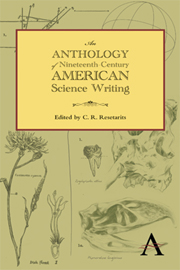Book contents
- Frontmatter
- Contents
- Preface
- Part One 1800–1846 Naturals and Naturalists
- Part One Introduction
- “A Memoir on the Discovery of Certain Bones of a Quadruped of the Clawed Kind in the Western Parts of Virginia,” Transactions of the American Philosophical Society (1799)
- “Pileated Woodpecker,” American Ornithology; or the Natural History of the Birds of the United States (1801)
- “Currents,” The New American Practical Navigator (1802)
- “Account of a North American Quadruped, supposed to belong to the Genus Ovis, Rocky-Mountain Sheep, Ovis Montana,” Journal of the Academy of Natural Sciences of Philadelphia (1817)
- “A Monograph of North American insects, of the genus Cincindela” (excerpt) Transactions of the American Philosophical Society (1818)
- “On the Genus Ocythoe,” Philosophical Transactions of the Royal Society of London (1819)
- “Preface,” American Entomology, or Descriptions of the Insects of North America (1824–28)
- “Preface” (excerpt), The Genera of North American Plants and a Catalogue of the Species, to the Year 1817 (1818)
- “Pileated Woodpecker,” Manual of the Ornithology of the United States and Canada (1832)
- “Introduction,” Ichthyologia ohiensis, or natural history of the fishes inhabiting the river Ohio and its tributary streams (1820)
- “Notices of Materia Medica, or new medical properties of some American Plants,” Western Minerva or, American Annals of Knowledge and Literature (1820)
- “Passenger Pigeon,” Ornithological Biography (1831)
- “On the Production of Currents and Sparks of Electricity from Magnetism,” American Journal of Science and Arts (July 1832)
- “The Contagiousness of Puerperal Fever” (excerpts), New England Quarterly Journal of Medicine (1843)
- “On the Two Storms Which Were Experienced throughout the United States, in the Month of February, 1842” (excerpt) Transactions of the American Philosophical Society (1845)
- Part Two 1846–1876 Warriors
- Part Three 1876–1900 Scientists
- Bibliography
Part One Introduction
from Part One - 1800–1846 Naturals and Naturalists
Published online by Cambridge University Press: 05 June 2012
- Frontmatter
- Contents
- Preface
- Part One 1800–1846 Naturals and Naturalists
- Part One Introduction
- “A Memoir on the Discovery of Certain Bones of a Quadruped of the Clawed Kind in the Western Parts of Virginia,” Transactions of the American Philosophical Society (1799)
- “Pileated Woodpecker,” American Ornithology; or the Natural History of the Birds of the United States (1801)
- “Currents,” The New American Practical Navigator (1802)
- “Account of a North American Quadruped, supposed to belong to the Genus Ovis, Rocky-Mountain Sheep, Ovis Montana,” Journal of the Academy of Natural Sciences of Philadelphia (1817)
- “A Monograph of North American insects, of the genus Cincindela” (excerpt) Transactions of the American Philosophical Society (1818)
- “On the Genus Ocythoe,” Philosophical Transactions of the Royal Society of London (1819)
- “Preface,” American Entomology, or Descriptions of the Insects of North America (1824–28)
- “Preface” (excerpt), The Genera of North American Plants and a Catalogue of the Species, to the Year 1817 (1818)
- “Pileated Woodpecker,” Manual of the Ornithology of the United States and Canada (1832)
- “Introduction,” Ichthyologia ohiensis, or natural history of the fishes inhabiting the river Ohio and its tributary streams (1820)
- “Notices of Materia Medica, or new medical properties of some American Plants,” Western Minerva or, American Annals of Knowledge and Literature (1820)
- “Passenger Pigeon,” Ornithological Biography (1831)
- “On the Production of Currents and Sparks of Electricity from Magnetism,” American Journal of Science and Arts (July 1832)
- “The Contagiousness of Puerperal Fever” (excerpts), New England Quarterly Journal of Medicine (1843)
- “On the Two Storms Which Were Experienced throughout the United States, in the Month of February, 1842” (excerpt) Transactions of the American Philosophical Society (1845)
- Part Two 1846–1876 Warriors
- Part Three 1876–1900 Scientists
- Bibliography
Summary
Three themes dominated the science of this period: exploration, classification, and utilization. Jefferson, in his famous letter of instruction to Meriwether Lewis, illustrated the tone: “The object of your mission is to explore the Missouri river, & such principal stream of it, as, by it's course & communication with the waters of the Pacific Ocean, whether the Columbia, Oregon, Colorado or any other river, may offer the most direct and practicable water communication across this continent, for the purposes of commerce.” He also listed among the “objects worthy of notice” animals, plants, minerals, soil, topography, and climate. Embedded in this letter – the main focus of which was trade, commerce, and navigation – were Jefferson's own scientific interests, kept subordinate because of the reluctance of Jefferson's largely mercantile oriented congress to pay for science that did not promise a commercial payoff. The pro-British mercantile elite found many of the enlightenment tendencies of the Francophile Jefferson suspect, superfluous, ungodly, but this judgment was more a matter of politics, balance, economy, and utility than any true anti-science bias. The outstanding American scientists of the previous century, Franklin, Bartram, Rittenhouse, all had roots in the mercantile class and were themselves mindful of the young country's need for practical and useful knowledge. Jefferson too thought of science in terms of utility, for though he might not view commerce as the sole guide for scientific activity, he always tended toward a measure of utility.
- Type
- Chapter
- Information
- Publisher: Anthem PressPrint publication year: 2012



